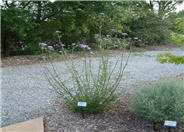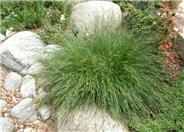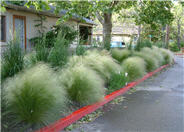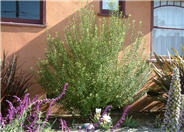
Common name:Brazilian Lilac Verbena
Botanical name:Verbena bonariensis
This 4'-5' tall plant is a drought hardy performer, with blooms atop the sturdy, squarish stem all summer and fall. The flower is a striking purple tuft that makes a good fresh or dried flower. The sparse foliage makes this a great accent flower that hovers high and blends well. Deadheading will prolong its blooming.

Common name:California Meadow Sedge
Botanical name:Carex pansa
This native Carex can be successfully used as a lawn substitute but requires significant water to obtain good coverage. Once coverage is reached, water can be reduced and maintenance is close to zero. Unmowed, the plant can be used effectively in a variety of conditions and will reach a height of 6" or under and spreads up to 2' by rhizomes.

Common name:Mexican Feather Grass
Botanical name:Nassella tenuissima
This ornamental grass grows to 2' tall. It goes partially dormant during the summer but green in spring and fall. It prefers a sunny, well drained site. This plant can be invasive in some areas, so use caution. To keep reseeding to a minimum, drip irrigation will be best. Cut back in early spring to remove dormant foliage and dried seed heads. It can also tolerate dry shade. It grows to 10" wide and is the finest textured of the ornamental grasses.

Common name:Iceberg Floribunda Rose
Botanical name:Rosa 'Iceberg'
This is a shrub rose (there are climbing varieties) with an abundance of fragrant, medium sized, white blooms. It is one of the most popular roses and very tough.

Common name:Blackstem Pittosporum, Tawhiwhi
Botanical name:Pittosporum tenuifolium
This medium sized evergreen shrub has medium green leaves with black stems. Its pleasing texture and narrow, upright growth make this a fine hedge or screen. It is easy to grow in soils with good drainage. Many new cultivars are being introduced with smaller, variegated and/or multi-colored foliage.
| Designer: Dustin Gimbel | Prairie Strip Two |
Photographer: GardenSoft |
Soils and Compost:
Practice grass-cycling by leaving short grass clippings on lawns after mowing, so that nutrients and organic matter are returned to the soil.
Water Saving Tip:
Check your irrigation system for breaks, leaks and problems once a month.
Integrated Pest Management:
Attract, or buy beneficial insects such as ladybugs and lacewings to control pest outbreaks in your garden.
